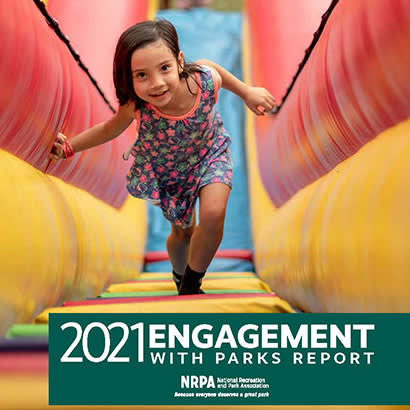
For an enhanced digital experience, read this story in the ezine.
“Because everyone deserves a great park” is not only NRPA’s tagline, but also a statement that represents the mission for public parks and recreation. Unfortunately, many communities have not been entirely successful in delivering on this mission. The 2021 NRPA Engagement With Parks Report finds that 29 percent of U.S. residents — nearly 100 million people — do not live within a walkable distance of at least one local park or other recreation amenity.
People are more likely to be park users if they live near one. Sixty-five percent of 2021 Engagement With Parks Report survey respondents who live within walking distance of at least one park or recreation opportunity had been park and recreation users within a month of taking the survey. However, only 36 percent of respondents not living within a walkable distance did the same. People living near park and recreation infrastructure use these resources twice as much as others.
Every person has a unique, personal relationship with parks and recreation. For one person, parks and recreation may be the local trail. For another person, parks and recreation is where their children make new friends or play sports. For others, parks and recreation is the place for continued learning and giving back to the community.
But inequitable access has deprived many people of parks and recreation’s many lifesaving and life-enhancing benefits. Further compounding this disparity is when segments of the community find a dearth of park and recreation programming and amenities. This gap in amenities and services has a long history in this nation. I encourage you to review our Equity in Parks and Recreation: A Historical Perspective story map.
The Public Wants Equitable Parks and Recreation
People agree that equity is a crucial mission of parks and recreation. Six out of seven respondents to the 2021 NRPA Engagement With Parks Report survey agree that the NRPA equity pillar is an important goal they want their local park and recreation agency to have. Sixty-nine percent of people say that equity should be a “very important” part of their local agency’s mission. Respondents from various backgrounds want park and recreation professionals and agencies to strive for greater equity.
Similarly, people want the government to provide the financial resources that narrow the inequities hampering parks and recreation. Eighty-seven percent of respondents to this survey want their local and state governments to sufficiently fund local park and recreation agencies to ensure that every community member has equitable access to amenities, infrastructure and programming. Support for government spending to narrow park and recreation inequities crosses every segment of the U.S. populace. This includes political divisions with firm support among people who identify as Democrats, Republicans and independents at 91 percent, 85 percent and 86 percent, respectively.
Narrowing park and recreation’s equity gap will not happen overnight. Dr. John L. Crompton noted in his October “Finance for the Field” column that there are many challenges that communities must overcome to ensure greater park and recreation equity. Today, many agencies face great difficulty securing sufficient funding to deliver current services, a problem further exasperated by the coronavirus (COVID-19) pandemic. This problem is particularly acute in cities, towns and counties with slow growing (or contracting) tax bases and rising demands for government services. The field must develop innovative and sustainable funding models that promote greater equity in the delivery of park and recreation offerings.
The journey to greater equity will be a long one. But do not mistake the length of this journey with a lack of urgency. Narrowing the equity gaps will result from the hard work and dedication of park and recreation professionals and advocates collaborating with community partners and political leaders. Everyone deserves a great park. Are you ready to lead these efforts in your community?
Kevin Roth is NRPA Vice President of Research, Evaluation and Technology.

